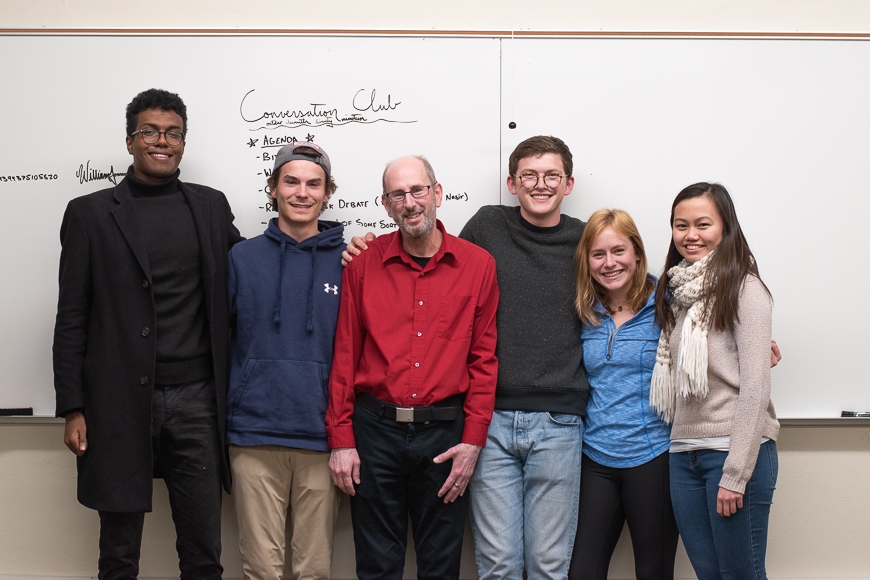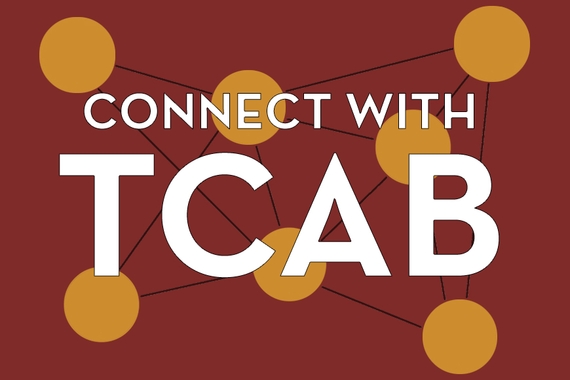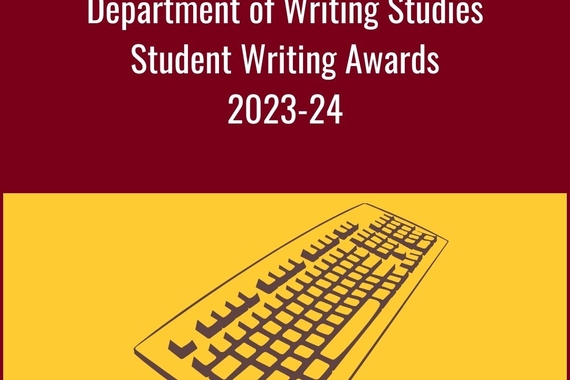Acquiring Applicable Skills: Using First-Year Writing to Your Advantage
Angelo Volpe, two in from the left, with some of his students.
“I’m a math [and] physics geek who loves writing and literature,” says Senior Lecturer Angelo Volpe.
While taking the required first-year writing course, WRIT 1301, students may be surprised to learn that Volpe takes a different approach to writing than most of their teachers. He developed the analytical walk, a straightforward writing technique for his students: defining a concept, finding a textual example, and, finally, performing an analysis. With 31 years of teaching under his belt, Volpe has his first-year writing course down to a science.
Writing for Reason
Volpe, equipped with his juris doctorate degree from the U’s Law School, has taught a myriad of courses and subjects. He educated developmentally disabled adults in Staten Island at A Very Special Place, Inc. (A.V.S.P. Inc.), instructed English as a second language at Pace University in New York and Seoul National University in South Korea, and has experience teaching literature, philosophy, business negotiations, writing and argument, and directed studies. This wide range of experiences helped Volpe identify the best methods for teaching a writing class, and he is more than eager to share his wisdom with his students.
There are a variety of important skills a student learns when taking a course like Volpe’s. His class focuses on more than the writing basics; he emphasizes logical reasoning and frequently ties in analysis and argument. Volpe combines applicable skill drills with modeling examples to help his students develop and follow a useable structure. He elaborates, “There is more than one right answer, but there are definitely wrong answers [...] you know you have a right answer when you can reason to a logical conclusion.”
Targeting specific audiences and building effective arguments for them is something that Volpe encourages his students to constantly consider. Volpe stresses that arguments need to be built on foundations that are connected to the core values of the targeted audience: “You need to build it based on what people really care about, and you can still do amazing things.”
Writing Above and Beyond
In the classroom, Volpe encourages his students to work hard on each paper. He noticed that the students who feel that they will fail his class end up getting some of the best grades because they do not quit. Persistence is key; despite having severe generalized anxiety disorder and a hearing impairment, Volpe comes to class every day ready to help each of his students.
Outside of the classroom, he requires that they schedule one 15-minute conference with him during office hours, which, in Volpe’s opinion, is one of the most important things students can do with their professors. “I require one conference a semester [...] I don’t waste any time—the average office hour meeting I have with a student is anywhere from two to five minutes because I can zero in on exactly what’s causing them trouble, and we solve it.” His only objective is to help students write better, and sitting down during office hours allows for Volpe and his student to determine what the best strategy is to solve any problems that may arise while writing.
Students acquire a new analytical skill set that can be used inside and outside the classroom. These skills translate to dealing with practical realities like using business communications and professional writing in the workplace.
Volpe says, “I think I teach the most important undergraduate class here [because of the] logical reasoning and precise communication. There is no degree, no discipline, no profession where that’s not a big asset.”
Going Beyond the Classroom
There is a Korean proverb that, when translated, says, “King, teacher, father: one body.” Simply, this means “the teacher, like the parent, has a responsibility to take care of his or her students [...] to always act in their best interests,” explains Volpe. He holds himself to this proverb when teaching his students, and he takes the teacher-student relationship very seriously. He believes that his role as a professor extends beyond the classroom. In fact, he started a group, Convo Club, that fosters philosophical conversations and debates among Volpe’s former students and himself.
Jill Schuster, a pre-med chemistry major who took Volpe’s class freshman year and loves attending Convo Club, says, “I look forward to every meeting because I am confident that I will learn something new and have my own ideas challenged.” As a student who was conditioned to write scientifically and without expressing herself, Schuster was happy to find that Volpe “created a safe place for my opinions, self-expression, and philosophical questioning.”
Volpe’s impact resonates with his students long after they pass his class. Former student and a current member of the Convo Club, Marcos Zachary shares his thoughts about his past professor: “Volpe’s care and passion for his students are unparalleled. He taught me how to be a critical thinker and what the true meaning of an educator should be. He helped me in physics, math, chemistry, and all other subjects because he ignited my passion to look beyond the surface in each subject and think logically on a deeper level.”
In addition to teaching and leading the Convo Club, Volpe creates indie films that deal with some kind of ethical issue that society faces (currently, he’s working on his fifth feature film titled Butch, which Volpe describes as a “gay vigilante film”). He talks about these complicated issues with his friends and former students to develop a balanced script that portrays both sides of the issue and opens up the conversation for his audience.
Striving for Student Success
Despite having many commitments outside of the classroom, Volpe makes his students’ success a priority and fosters lasting relationships that make his students better citizens. This dedication is what makes this first-year writing course such an asset to students’ lives. Schuster shares, “He cares more about his students than any other professor/teacher I have had since high school.”
This story was written by an undergraduate student in CLAgency. Meet the team.
Become a technical writing and communication major.
Are you interested in data visualization? Technical communicators do this and so much more. Technical writing and communication involves communicating complex information to specific audiences with clarity and accuracy. Technical communicators write, organize, edit, and design information for a variety of careers in business, technology, science, health, law, and more.




